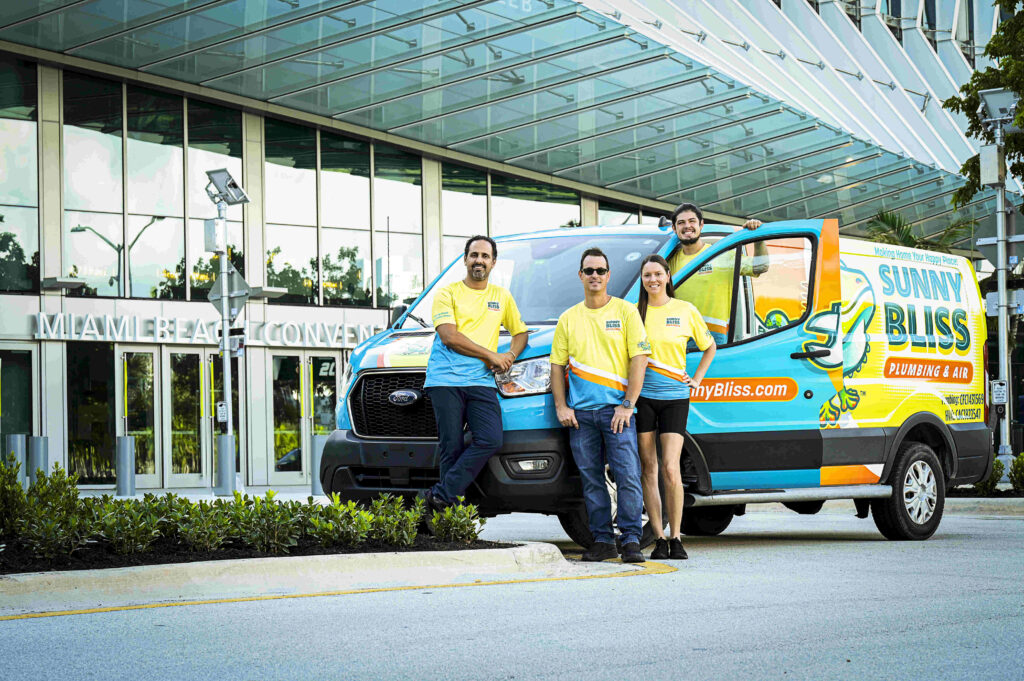The Ultimate HVAC Maintenance Guide By Sunny Bliss

Your home’s heating, ventilation, and air conditioning (HVAC system) is one of the most critical components for maintaining comfort throughout the year. At Sunny Bliss, we understand that a well-functioning HVAC system is not just about comfort – it’s about health, efficiency, and saving money.
Regular maintenance of your HVAC system is essential for several reasons. First, it ensures your system operates at peak performance, providing consistent heating and cooling throughout your home. Second, it helps identify potential issues before they become major problems, saving you from costly repairs down the line. Third, a properly maintained system improves indoor air quality, reducing allergens and contaminants in your home’s air.
At Sunny Bliss, We’ve seen firsthand how neglected systems can lead to unexpected breakdowns, inefficient operation, and shortened equipment lifespan. Our comprehensive HVAC maintenance tips are designed to help homeowners maintain their systems properly and avoid these common pitfalls.
What Should Be Included in an Annual HVAC Maintenance Plan?
How Often Should You Schedule HVAC Maintenance Appointments?
For most homeowners, scheduling HVAC maintenance twice a year is ideal – once before the cooling season and once before the heating season. This seasonal maintenance approach ensures your system is ready to handle the demands of extreme temperatures.
At Sunny Bliss, we recommend scheduling your cooling system check in early spring and your heating system check in early fall. This timing allows our technicians to identify and address any issues before you need to rely heavily on your system.
For those with newer systems or those who want more comprehensive coverage, our annual HVAC maintenance packages provide peace of mind with regular check-ups and priority service.
What Does a Professional HVAC Maintenance Visit Include?
When you schedule a maintenance visit with an HVAC technician, they should perform a comprehensive inspection and tune-up of your entire system. Here’s what a professional maintenance visit typically includes:
- System inspection: A thorough examination of all HVAC equipment components, including the heat exchanger, refrigerant lines, electrical connections, and controls.
- Cleaning: Cleaning of critical components such as condenser coils, evaporator coils, and the condensate drain lines to ensure proper operation.
- Testing: Performance testing to verify the system’s efficiency and identify any potential issues.
- Adjustments: Fine-tuning of thermostat settings, gas pressure, and other parameters to optimize performance.
- Filter replacement: Checking and replacing dirty air filters to maintain proper airflow and system efficiency.
At Sunny Bliss, our comprehensive maintenance visits go beyond this basic list to ensure your system receives the attention it deserves. We document all findings and recommendations, providing you with a clear understanding of your system’s condition and any necessary follow-up actions. You can give us a call on 305-990-1399 for queries.
What Are Essential HVAC Preventative Maintenance Tasks for Homeowners?
How Can You Maintain Your Air Conditioner Between Professional Visits?
While professional maintenance is crucial, there are several tasks homeowners can perform between visits to keep their air conditioning system running efficiently:
- Change air filters regularly: This is perhaps the most important DIY maintenance task. Dirty filters restrict airflow, forcing your system to work harder and consume more energy. For most homes, checking filters monthly and replacing them every 1-3 months is recommended.
- Keep the outdoor unit clear: Ensure your outdoor condenser unit has at least two feet of clearance on all sides. Remove debris, trim vegetation, and occasionally rinse the unit (when turned off) to remove dirt buildup.
- Clean supply and return vents: Vacuum your vents regularly to remove dust and ensure proper airflow throughout your home.
- Monitor performance: Pay attention to your system’s performance. Unusual noises, odors, or inadequate cooling/heating could indicate problems that require professional attention.
Homeowners who diligently perform these simple tasks between professional maintenance visits enjoy more reliable performance and longer system life.
How Should You Prepare Your Heating and Cooling System for Season Changes?
Seasonal transitions require specific preparation to ensure your system can handle changing demands:
For cooling season preparation:
- Remove covers from outdoor units
- Clean or replace air filters
- Test the system before hot weather arrives
- Set programmable thermostats to summer schedules
- Check that vents are open and unobstructed
For heating season preparation:
- Schedule a professional inspection of heating components
- Test heating functions before cold weather arrives
- Check carbon monoxide detectors and replace batteries
- Inspect ductwork for leaks or damage
- Set thermostats to winter schedules
These seasonal transitions are the perfect time to schedule professional maintenance to ensure all components are functioning properly before they’re heavily used.
What Are Common HVAC Problems And Their Solutions?

How Can You Identify Potential Refrigerant Leaks Early?
Refrigerant leaks can significantly impact your system’s cooling capacity and efficiency. Early warning signs include:
- Diminished cooling performance
- Ice formation on refrigerant lines or evaporator coils
- Hissing sounds near the indoor or outdoor unit
- Higher than normal electric bills
If you suspect a refrigerant leak, it’s crucial to contact a professional immediately. Refrigerant handling requires special certification and equipment, making this a job exclusively for professionals.
What Causes Uneven Cooling Throughout Your Home?
Uneven temperatures are a common complaint among homeowners. Several factors can contribute to this issue:
- Improperly sized ductwork
- Closed or blocked vents
- Inadequate insulation in certain areas
- Thermostat placement issues
- Zoning system malfunctions
At Sunny Bliss, we perform comprehensive airflow assessments to identify the root causes of temperature inconsistencies and recommend appropriate solutions, which might include duct modifications, additional insulation, or zoning system upgrades. Give us a call today on 305-990-1399.
How Can You Prevent Carbon Monoxide Leaks from Your Heating System?
Carbon monoxide leaks pose a serious health risk and typically stem from cracked heat exchangers, blocked flues, or improper ventilation. To minimize this risk:
- Install and regularly test carbon monoxide detectors on every level of your home
- Schedule annual professional inspections of fuel-burning heating systems
- Ensure proper ventilation around all HVAC equipment
- Never operate unvented combustion appliances indoors
- Address any unusual odors or symptoms (headaches, dizziness) immediately
Professional inspection of your heat exchanger and exhaust system is the most reliable way to prevent this serious hazard.
How Does HVAC Maintenance Impact Energy Costs?
What Role Do Dirty Condenser Coils Play in Energy Consumption?
Condenser coils release heat from your home to the outside environment. When these coils become dirty or clogged with debris, heat transfer becomes less efficient, forcing your system to work harder and consume more energy.
Regular cleaning of condenser coils can improve efficiency by up to 15%, directly translating to lower energy bills. This simple maintenance task has one of the highest returns on investment in terms of energy savings.
How Do Clean Air Filters Contribute to System Running Efficiently?
Air filters play a dual role in your HVAC system: protecting internal components from dust and debris while also improving air quality in your home. When filters become clogged, several negative consequences occur:
- Restricted airflow forces blower motors to work harder
- Reduced heat exchange efficiency
- Increased wear on system components
- Higher energy consumption
- Potential system overheating
Replacing filters regularly (every 1-3 months depending on usage and filter type) is one of the simplest yet most effective ways to maintain efficiency and reduce energy consumption.
What Impact Does Routine Maintenance Have on Energy Bills?
Studies consistently show that regular professional maintenance can reduce energy costs by 15-30%. This significant saving comes from:
- Properly lubricated moving parts reducing friction and energy waste
- Clean heat exchange surfaces improving efficiency
- Correctly calibrated controls preventing overrunning
- Properly charged refrigerant systems operating at designed efficiency
- Sealed ductwork preventing conditioned air loss
The initial investment in maintenance typically pays for itself through energy savings, not to mention the benefit of avoiding premature replacement of equipment.
How Can HVAC Maintenance Extend Your System Life?

Sunny Bliss plumbing technician with customer
What Maintenance Tasks Most Significantly Impact HVAC Unit Lifespan?
The average HVAC system lifespan is 15-20 years, but without proper maintenance, many systems fail prematurely. The following maintenance tasks have the greatest impact on extending system life:
- Regular professional inspection of electrical components and connections
- Timely lubrication of moving parts to prevent wear
- Prompt replacement of worn belts and other wearing components
- Maintaining proper refrigerant charge
- Keeping heat exchange surfaces clean
- Ensuring condensate drainage systems function properly
Each of these tasks prevents accelerated wear that can lead to premature system failure.
How Does a Well Maintained System Delay the Need for a New HVAC System?
Replacing an HVAC system typically costs between $5,000 and $15,000, making it one of the most significant home maintenance expenses. Regular maintenance extends equipment life by:
- Preventing small issues from cascading into major component failures
- Maintaining efficient operation that reduces system strain
- Preventing electrical component damage from voltage fluctuations
- Ensuring proper airflow that prevents compressor and heat exchanger stress
- Maintaining proper refrigerant charge that prevents compressor damage
By investing in regular maintenance, homeowners can often add 5-10 years to their system’s useful life, substantially delaying the need for replacement.
How Does HVAC Maintenance Improve Indoor Air Quality?
What Steps Can Improve Air Quality in Your Home?
Indoor air is often more polluted than outdoor air, making air quality management an important consideration for health-conscious homeowners. HVAC maintenance plays a critical role in managing indoor air pollutants through:
- Regular filter changes to capture airborne particles
- Cleaning of evaporator coils to prevent mold growth
- Proper humidity control to discourage dust mites and mold
- Ensuring adequate ventilation and fresh air exchange
- Professional duct cleaning when necessary
These maintenance steps help reduce allergens, particulates, and volatile organic compounds that can impact health and comfort.
How Do Clean Ducts and Components Contribute to Better Air Quality?
Over time, your ductwork and HVAC components can accumulate dust, mold, and other contaminants. This buildup can:
- Harbor allergens and pathogens
- Restrict airflow and reduce system efficiency
- Release particles into your home’s air with each system cycle
- Create odors and air quality issues
Professional cleaning of these components, especially in homes with allergy sufferers, can significantly improve indoor air quality and reduce respiratory issues.
What’s Included in a Comprehensive HVAC Maintenance Checklist?
How Does a Professional Evaluate HVAC System’s Performance?
Professional HVAC technicians use a variety of tools and techniques to evaluate system performance:
- Temperature differential measurements: Checking the temperature difference between return and supply air to verify proper cooling or heating function.
- Amperage and voltage testing: Ensuring electrical system components are operating within specified ranges.
- Pressure testing: Verifying refrigerant pressures meet manufacturer specifications.
- Airflow measurement: Confirming proper CFM (cubic feet per minute) airflow through the system.
- Combustion analysis: For gas systems, checking combustion efficiency and safety.
These measurements provide objective data about system performance and help identify issues that might not be apparent through visual inspection alone.
What Items Should Be on Your Seasonal Maintenance Checklist?
For spring (pre-cooling season) maintenance:
- Clean or replace air filters
- Clean condenser coils
- Check refrigerant levels
- Inspect and clean condensate drain lines
- Test capacitors and contactors
- Check thermostat calibration
- Lubricate moving parts
- Inspect ductwork for leaks
- Test safety controls
- Check electrical connections and components
For fall (pre-heating season) maintenance:
- Clean or replace air filters
- Inspect heat exchanger for cracks
- Test ignition system
- Check gas pressure and connections
- Verify proper venting
- Test safety controls
- Check for carbon monoxide leaks
- Lubricate moving parts
- Inspect ductwork for leaks
- Test thermostat calibration
This comprehensive approach ensures both heating and cooling components receive appropriate attention before their peak usage seasons.
How Can You Ensure Your System Maintains Optimal Performance?

What Are the Benefits of Working with a Professional for HVAC System’s Maintenance?
While some maintenance tasks can be performed by homeowners, professional maintenance offers several distinct advantages:
- Expertise: Trained technicians can spot issues that most homeowners would miss.
- Specialized tools: Professionals have access to diagnostic equipment that can identify problems before they cause failures.
- Warranty protection: Many manufacturers require professional maintenance to keep warranties valid.
- Safety: Professional handling of electrical components, refrigerants, and gas systems reduces safety risks.
- Efficiency optimization: Technicians can fine-tune systems to achieve maximum efficiency and performance.
At Sunny Bliss, our technicians undergo continuous training to stay current with the latest HVAC technologies and maintenance techniques, ensuring your system receives the highest quality care.
How Can You Avoid Costly Repairs Through Preventative Maintenance?
The most expensive HVAC repairs typically result from neglected maintenance. For example:
- A simple filter change costing $20 can prevent a $500 blower motor replacement
- Regular coil cleaning costing $150 can prevent a $2,000 compressor failure
- A $10 capacitor replacement during maintenance can prevent a $250 emergency service call
- Addressing minor refrigerant leaks early can prevent major system damage
The cost-benefit analysis clearly favors preventative maintenance, with most homeowners saving $1,000-$3,000 in repair costs over the life of their system through regular professional maintenance.
Conclusion: Making HVAC Maintenance a Priority
Maintaining your HVAC system is not just about avoiding problems—it’s about ensuring comfort, health, and efficiency in your home. A comprehensive maintenance approach combines professional service with homeowner vigilance to keep systems running at their best.
At Sunny Bliss, we’re committed to helping our customers achieve the longest possible service life from their HVAC investments while maintaining optimal comfort and efficiency. Our maintenance plans make it easy to keep your system in top condition without having to remember scheduling details or worry about unexpected failures.
By making HVAC maintenance a regular part of your home care routine, you’ll enjoy more consistent comfort, lower energy costs, better indoor air quality, and fewer unexpected repairs. The small investment in regular maintenance pays dividends in both financial savings and peace of mind.
Remember that your HVAC system is one of the most valuable and essential systems in your home. Treating it with the care it deserves through regular maintenance is the smartest approach to protecting this important investment.